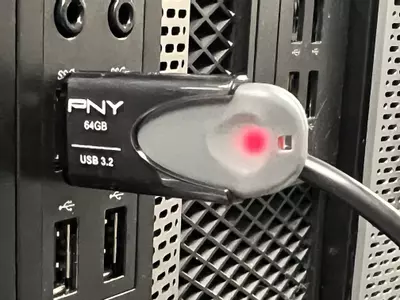
A system for install flash drives
At work, we have to provision instruments and install applications on different machines throughout the office. I used to have a collection of flash drives that I would toss different drivers, installers, and scripts onto but then I’d end up with lots of them labeled “chip’s junk”. Finally I had enough and merged them all into one drive.
But, then I found syncthing for my laptops and
desktops. We have a handful of janky .NET applications that aren’t portable
and require strange third party component libraries with proprietary installers.
When I was working on one of the apps on a different machine I was tossing new
builds to test into my wipshared shared folder, but decided to make an
installers shared folder.
Then, I wanted to combine the two, and had a syncthing share that’d do 90% of
the work but I had a flash drive that I could take on trips or onto airgapped
machines. I used one of my linux desktop machines and configured syncthing
to replicate the installers folder onto a mounted flash drive.
Net. via
Syncthing
│
└──────────► FlashDrive1
│
Crontab ├───►Primary Flash Drive
Sync Script │───►Alternate Flash Drive
└───►Archive SSDSyncthing is synchronizing the installers folder onto one flash drive
connected to the machine and every minute a synchronize script triggers
rsync synchronization from FlashDrive1 onto two more flash drives and
an archive SSD.
FlashDrive1 is intended to stay constantly connected to the linux machine
while my “Primary Flash Drive” is what I pull and connect to instruments and
other PCs to perform installations. The “Alternate Flash Drive” is one that
I can give to other folks that need up-to-date installers.
Each of the flash drives is mounted by their block device ID within the fstab file on the machine, this allows for hotplugging of the flash drive (as long as I avoid pulling the drive out as the activity light is flashing).
# /etc/fstab: static file system information.
#
# Use 'blkid' to print the universally unique identifier for a
# device; this may be used with UUID= as a more robust way to name devices
# that works even if disks are added and removed. See fstab(5).
#
# <file system> <mount point> <type> <options> <dump> <pass>
PARTUUID=fdea6754-5d35-44a5-aad4-0a7166b3bd5d /mnt/workarchive exfat auto,uid=1000,gid=1000,nofail,x-systemd.automount,x-systemd.idle-timeout=2,x-systemd.device-timeout=2 0 0
PARTUUID=ed2ae601-01 /mnt/install2 exfat auto,nofail,uid=1000,gid=1000,x-systemd.automount,x-systemd.idle-timeout=2,x-systemd.device-timeout=2 0 0
PARTUUID=c6d4f689-01 /mnt/installalt exfat auto,nofail,uid=1000,gid=1000,x-systemd.automount,x-systemd.idle-timeout=2,x-systemd.device-timeout=2 0 0
PARTUUID=e1f303f4-01 /mnt/chipinstl exfat auto,nofail,uid=1000,gid=1000,x-systemd.automount,x-systemd.idle-timeout=2,x-systemd.device-timeout=2 0 0fstab even has a helpful hint about using
blkidto get the UUIDs
Now when I build a new installer of an application or update a script I toss it into the syncthing folder and within a couple minutes - by the time I walk down to the closet that houses that specific linux machine - the files are present on the flash drives.
In the future I’d like to expand this to automatically sync from our JFrog/S3 buckets that house artifacts so I get a new installer right after CI/CD completes.
Also, I have nginx serving files from the syncthing directory so it’s possible to access files within the drive share over HTTP as yet another option.
Update 1
I forgot to include the cheat sheet for configuring flash drives that can be mounted on most operating systems (AKA exfat)
# Install exfat tools
apt install exfatprogs
# Create filesystem on flash drive
mkfs.exfat -L install1 /dev/sdd1